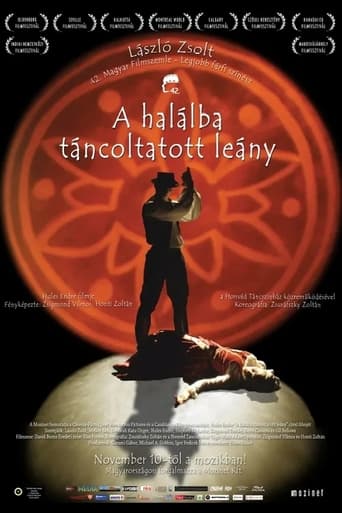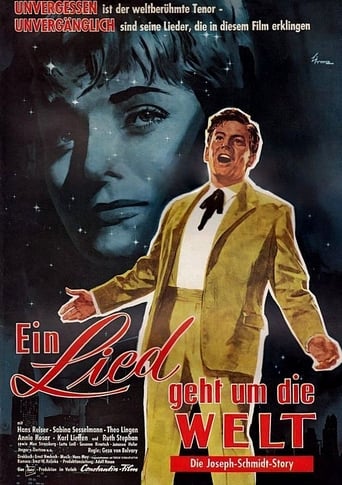Best movies like Busch singt – Sechs Filme über die erste Hälfte des 20. Jahrhunderts
A unique, carefully handpicked, selection of the best movies like Busch singt – Sechs Filme über die erste Hälfte des 20. Jahrhunderts Starring Ernst Busch, and more. If you liked Busch singt – Sechs Filme über die erste Hälfte des 20. Jahrhunderts then you may also like: Night Crossing, Einmal ist keinmal, Knockout – Ein junges Mädchen, ein junger Mann, Kuhle Wampe or Who Owns the World?, Children of the Revolution and many more popular movies featured on this list. You can further filter the list even more or get a random selection from the list of similar movies, to make your selection even easier.
"Busch singt" consists of 6 films "About the first part of our century" and does not present Ernst Busch only as a singer but is a film with and about Busch as a chronicler and fighter for communist ideals of his time. Konrad Wolf died during the production, he directed part 3 "1935 oder Das Faß der Pandora" and part 5 "Ein Toter auf Urlaub".
You may filter the list of movies on this page for a more refined, personalized selection of movies.
Still not sure what to watch click the recommend buttun below to get a movie recommendation selected from all the movies on this list
Einmal ist keinmal
Actually, the Düsseldorf musician and composer Peter Weselin only wanted to spend his placid vacation with his uncle in the Vogtland village of Klingenthal. But in the city famous for its manufacture of musical instruments, the annual music festival is about to start. For the festival, the accordion factory asks Peter for a large composition for the symphonic orchestra. Furthermore, cute Anna asks him to write a pop song for her youth dance band. Thus, Peter finds no rest during his vacation.
Kuhle Wampe or Who Owns the World?
Kuhle Wampe takes place in early-1930s Berlin. The film begins with a montage of newspaper headlines describing steadily-rising unemployment figures. This is followed by scenes of a young man looking for work in the city and the family discussing the unpaid back rent. The young man, brother of the protagonist Anni, removes his wristwatch and throws himself from a window out of despair. Shortly thereafter his family is evicted from their apartment. Now homeless, the family moves into a garden colony of sorts with the name “Kuhle Wampe.”
Children of the Revolution
Inspired by the student revolutions of 1968, two women in Germany and Japan set out to plot world revolution as leaders of the Baader Meinhof Group and the Japanese Red Army. What were they fighting for and what have we learned?
The 3 Penny Opera
In London at the turn of the century, underworld kingpin Mack the Knife marries Polly Peachum without the knowledge of her father, the equally enterprising 'king of the beggars'.
Good Bye, Lenin!
Alex Kerner's mother was in a coma while the Berlin wall fell. When she wakes up he must try to keep her from learning what happened (as she was an avid communist supporter) to avoid shocking her which could lead to another heart attack.
The Promise
East-Berlin, 1961, shortly after the erection of the Wall. Konrad, Sophie and three of their friends plan a daring escape to Western Germany. The attempt is successful, except for Konrad, who remains behind. From then on, and for the next 28 years, Konrad and Sophie will attempt to meet again, in spite of the Iron Curtain. Konrad, who has become a reputed Astrophysicist, tries to take advantage of scientific congresses outside Eastern Germany to arrange encounters with Sophie. But in a country where the political police, the Stasi, monitors the moves of all suspicious people (such as Konrad's sister Barbara and her husband Harald), preserving one's privacy, ideals and self-respect becomes an exhausting fight, even as the Eastern block begins its long process of disintegration.
The Maiden Danced to Death
There were two brothers - two dancers - in Communist Hungary. One defected, the other stuck it out. One gave his soul to commerce, the other to the Party. After twenty years, they meet again. And the dance begins.
Milena
Prague, 1920. Milena's father wants her to follow in his footsteps and be one of the first female doctors in Czechoslovakia, but she is determined to be a writer. She elopes to Vienna with the Jewish music critic Ernst Pollak, and starts a correspondence with Franz Kafka. She leaves Pollak and returns to Prague with her father, where she befriends and translates Kafka. As a journalist, Milena covers the 1923 Ruhr worker's strike and meets the communist architect Jaromir.
Red Salute
The rebellious daughter of an army general gets involved with a Communist agitator, mainly to annoy her father. He arranges to have her kidnapped and taken to Mexico--hoping that she will forget her "Red" boyfriend--by a young, handsome soldier named Jeff who, while somewhat of a goof-up, the general believes is still better for her.
Professor Mamlock
Professor Hans Mamlock is the distinguished chief of surgery in a university hospital. The year is 1933, and although the Professor is Jewish, he remains unconcerned with politics and the growing Nazi threat. Mamlock identifies strongly as a German, and he believes his culture to be simply incapable of the common barbarism associated with the Nazi party. Accordingly, he shows little understanding for people with strong or unpopular political views, such as Walter, a patient, and Rolf, his own son. Indeed, when Rolf joins the communists in resisting the Nazis, Mamlock throws him out of his house. As the persecution of Jews intensifies during the 1930s, Mamlock's own daughter is targeted for anti-Semitic attacks at her school...
Hitler Youth Quex
Nazi propaganda film based on the life and death of Hitler Youth Herbert "Quex" Norkus – in the film, renamed Heini Völker – who was killed while distributing flyers in a Communist neighborhood.
Changing Skins
Inspired by West German terrorists, two pupils hijack a teacher in the GDR.//"Andreas Dresen is one of the most successful contemporary German filmmakers whose career began as the Berlin Wall was crumbling."// “Andreas Dresen’s films open a window into the hearts and minds of everyday people facing-yet not always surmounting-life’s challenges. Like Andrzej Wajda, Dresen consistently portrays the human condition with honest insight and compassion.”//
Erotik auf der Schulbank
A movie with three episodes directed by Hannes Dahlberg, Roger Fritz and Eckhart Schmidt.
Ein Ferienhaus auf Ibiza
In order to finally reconcile their adult, hopelessly chaotic children Karla, Henriette and Max, the resolute Greta takes an unusual approach: she invites all three to a holiday together in Ibiza, where she puts the brawlers to the choice: Either they tolerate themselves, or they are disinherited by their father Herbert. After a few half-hearted attempts to make peace, it will not be long before old conflicts break out. Thus, in sunny Spain, a turbulent round of family jealousies, heartache and unexpected love happiness unfolds.
American Reds: The Failed Revolution
The documentary AMERICAN REDS provides a historical overview of 20th century Communism and the growth, decline and contemporary relevance of the Communist Party, USA (CPUSA). Since its founding in 1919, the CPUSA has championed the struggles for democracy, labor rights, women’s equality, and racial justice. During its heyday in the 1930s and 1940s, it attracted millions of Americans to support its causes and almost 100,000 men and women to enlist in its ranks. The film begins with the Party's emergence as a small militant sect in the 1920s and documents its rise to the foremost radical group in the United States during the Great Depression, fighting against racism, sexism and fascism, as well as for the rights of workers to organize. It ends with the decline of the Party during the Cold War under the assaults of the FBI and anti- communist crusades.
100 Years of the UFA
The intricate history of UFA, a film production company founded in 1917 that has survived the Weimar Republic, the Nazi regime, the Adenauer era and the many and tumultuous events of contemporary Germany, and has always been the epicenter of the German film industry.
Das Kleid
Poor weavers Hans (Horst Drinda) und Kumpan (Werner Lierck) try to enter a town surrounded by a tall, impenetrable wall, where everyone is apparently very happy. When they finally make it inside, the tyrannical Emperor Max demands they make him new clothes that would "bring all creatures to their knees." Hans and Kumpan claim only intelligent people can see the robe, and in order to prove himself clever, the emperor haughtily displays himself before his subjects wearing his new invisible regalia.
Tanz auf dem Vulkan
Paris, 1830: Jean-Gaspard Debureau performs on the stage and delights his audience with song, wit and charm. He is, however, very unpopular with King Charles X, who is the target of much of Debureau's scornful jests. That would be a somewhat tolerable situation if it weren't for the fact that Debureau has fallen for a countess, who happens to be the King's mistress.
Brennende Ruhr
The two-piece black and white movie "Brennende Ruhr" portrays the events during the Kapp-Putsch 1920 in a small german town in the Ruhr district. The main protagonist is Ernst Sukrow, a student who sympathises first with the bourgeois forces but finally decided to join the communists in their fight.
Tage des Sturms
On June 17, 1953, there was an outrageous action between the Elbe and the Oder: the people in the GDR refused obedience to their political leadership. The story takes place in Bitterfeld and tells the story of a family involved in the political events around 17 June.
Ein Sommer in der Bretagne
Veterinarian Britta has recently separated from her boyfriend and is open to a new beginning, preferably in Brittany, where she spends the summer vacation with a befriend couple. After a rain shower, she unexpectedly stumbles upon her idyllic dream house, only to run over the fisherman Yves with her bike in her blissfulness. Unfortunately, Yves also wants to buy the house that is up for sale in an anonymous bidding process. He and his father can no longer make a living from fishing, and he wants to build up a second source of income in the form of holiday apartments. The empty neighboring house would be ideal for this. At first, Yves finds Britta more annoying than nice. But she gains ground with her fearless and positive nature. When Yves finds out who his opponent in the bidding process is, he tries to badmouth his beautiful home area in presence of the German doctor. Everything would be so much easier if it weren't for those darn feelings. House or love, that is the question now.
Ein Sommer auf Elba
Although Maja and Thorsten have been divorced for two years, it is important to them to go on vacation with their sons once a year. The thought is good, the execution miserable.
Ein Hahn im Korb
The Klemmers and the Neuberts live in a two-family house. The day before their driving test, Egon Klemmer and Bruno Neubert secretly buy a small blue Saporoshez from Ms. Stepper. Buying a car triggers turbulent entanglements, primarily due to Egon, who uses the little blue man for a secret jaunt.
Für Mord kein Beweis
After a fierce argument Steffi Zinn′s husband leaves the joint flat and stays away from home over night. The next morning, his wife Steffi has disappeared and is reported as a missing person. Captain Lohm takes over the case and at first looks for signs of a murder, but to no avail. Then, Steffi′s body is found in a lake. After her funeral, a stranger who had attended Steffi′s funeral for a short time is also found dead in a lake, and the connection between the two cases becomes apparent.








































Night Crossing
Two men want to escape from East Germany (under Communist rule) but they will only go if they can take their families with them. Based on a true story.